On 13 December 2023, The UP Law Center Institute of Human Rights (UP IHR) conducted a public forum on human immunodeficiency virus (HIV) titled “Beyond Laws: Exploring Realities of HIV Prevention and Care in the Philippines.” Launched in celebration of the 75th anniversary of the Universal Declaration of Human Rights (UDHR), the event was attended by representatives from the American Bar Association Rule of Law Initiative (ABA ROLI), Caloocan City Health Department, Department of Health Epidemiology Bureau, Department of Social Work and Development (DSWD), San Lazaro Hospital HIV/Aids Department, UP Diliman Health Service, UP Diliman Journalism Department, and the Red Whistle, among others.
In her opening remarks, Professor Elizabeth Aguiling-Pangalangan explained the importance of the public forum in exploring the effectiveness of the “Philippine AIDS Prevention and Control Act” and the “Philippine HIV and AIDS Policy Act” in stemming the Philippines’ growing HIV epidemic. Professor Aguiling-Pangalangan emphasized that the discourse was vital in understanding the current legal framework and identifying any potential gaps that may necessitate stronger policies.
Former Ifugao Representative Teodoro “Teddy” Baguilat, co-author of the Philippine HIV and AIDS Policy Act, presented the background of the said act. He recounted how the bill was passed in the midst of pushbacks from conservative and religious sectors. The former representative explained the pushback from conservative and religious sectors in legislating an HIV/AIDS law that could be more responsive to the country’s alarming HIV numbers. Despite this, Congress was able to expand testing and forego parental consent in the testing of minors. However, Hon. Baguilat noted that the HIV/AIDS law cannot exist in a vacuum. He further emphasized that the law must be read in conjunction with the Reproductive Health Law, Mental Health Law, and other pertinent legislation.
Meanwhile, Philippine College of Physicians President and San Lazaro Hospital Infectious Diseases Specialist Dr. Rontgene Solante discussed the nature and statistics of HIV/AIDS in the country. He reported that the Philippines has around 50 new HIV cases each day, with officials projecting 401,700 new infections by 2033. According to Dr. Solante, when the clusters began in 2010, 50 tested positive in one month, starting with men who had sex with other men. Today, the Philippines has around 50 new HIV cases each day, with officials projecting 401,700 new infections by the year 2033. Dr. Solante finally highlighted the importance of early HIV diagnosis and HIV treatment in improving the quality of life for people living with HIV.
Philippine National AIDS Council Executive Director Dr. Joselito R. Feliciano then talked about the effects of amending the HIV Law on nationwide access to HIV-related services. He explained that the amendment had improved the provision of support mechanisms such as free medicine, assistance with the livelihood of people with HIV, and the expansion of the Philippine National Aids Council Secretariat. The amendment has also established standards for parental education and instituted clear penalties for prohibited acts.
On the other hand, HIV Counselor and Case Manager Mr. Anthony Louie David of Project Ribbon shared his personal experiences as a person living with HIV (PLHIV), emphasizing how the country’s stigma against HIV made it difficult for infected individuals to lead normal lives.
During the open forum facilitated by UP IHR’s Atty. James Gregory Villasis, questions were raised concerning the rising occurrences of HIV/AIDS among the youths. The issue was discussed in light of the country’s social, legal, and political realities. A social worker from the audience asked about the law’s silence on HIV treatment of minors. According to Hon. Baguilat, the Implementing Rules and Regulations of the RH Law can supplement such lack in the law. Notably, an audience member also asked about the necessity of same-sex education in the Philippines. In response to this, the forum’s speakers explained that age-appropriate reproductive health education must be implemented in the country.
Finally, UP IHR Officer-in-Charge and Project Lead Atty. Daniel D. Lising, M.D. closed the event by pointing out that the forum was held to determine the gaps in our laws and situate them in the lived experiences of PLHIVS. He also reiterated the need to resolve the limitations of our current legal framework.

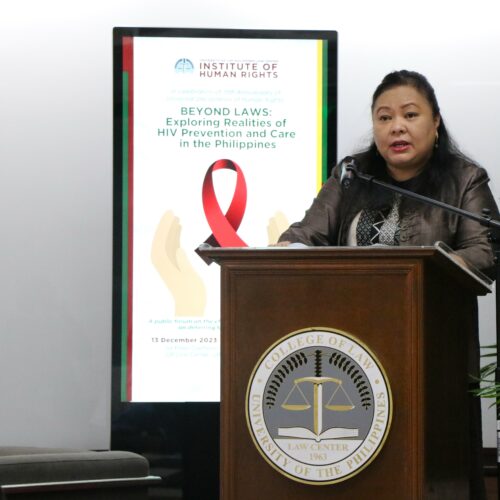
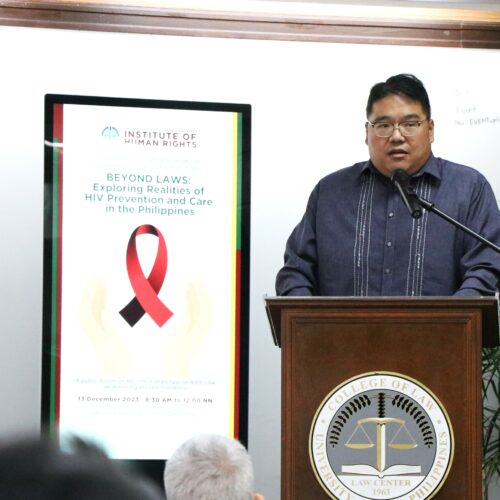
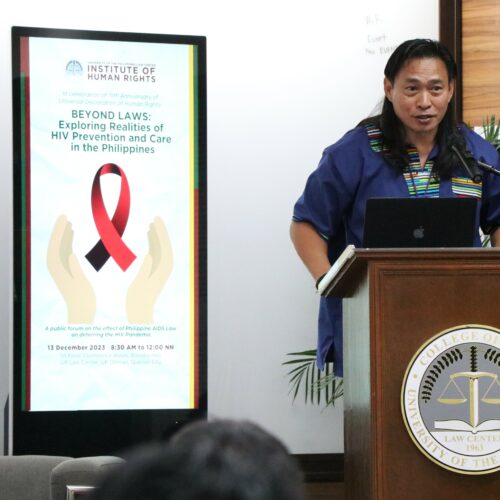
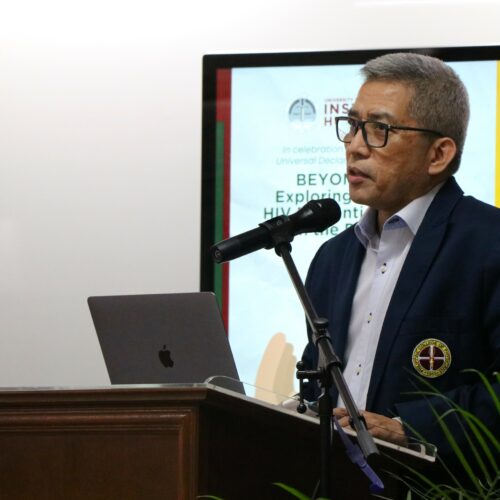
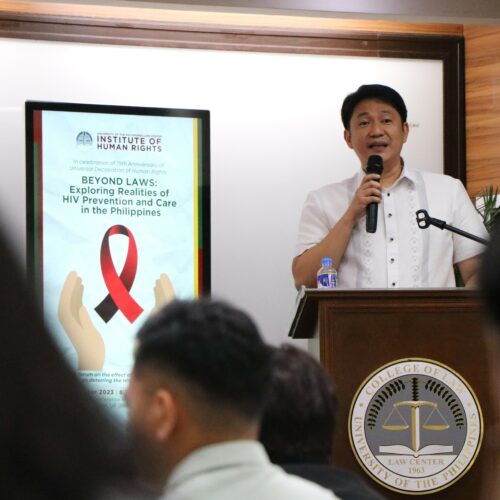
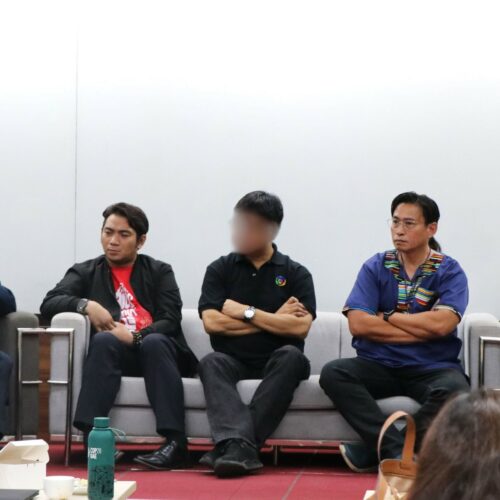
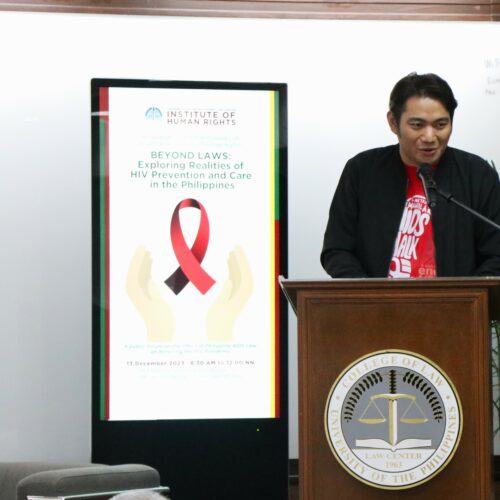
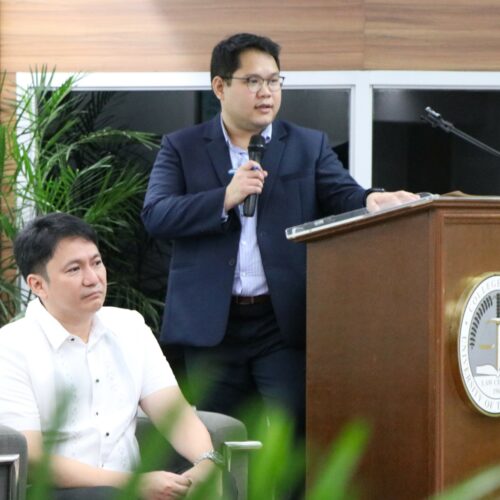






































































































 on the upper right corner to select a video.
on the upper right corner to select a video.